
The Hub. Submit your story.
Public Health Liberation wants to hear your stories.
Scroll to bottom of page to submit
Public Health Liberation is dedicated to elevating public health to be aligned with everyday experiences with health. This includes creative expression, news aggregation, and storytelling. We believe that pathways for improved community health is deeply embedded in being receptive and responsive to diverse human expression, communication, and needs. Public Health Liberation deeply values the indispensable role and contribution of women as the gateway for achieving health equity.
We want to share your story on health and well-being. We accept all perspectives and creative forms. We just require that your work is original and publishable on our website. We can also link to sources that you find compelling and relevant. Email info@publichealthliberation.com
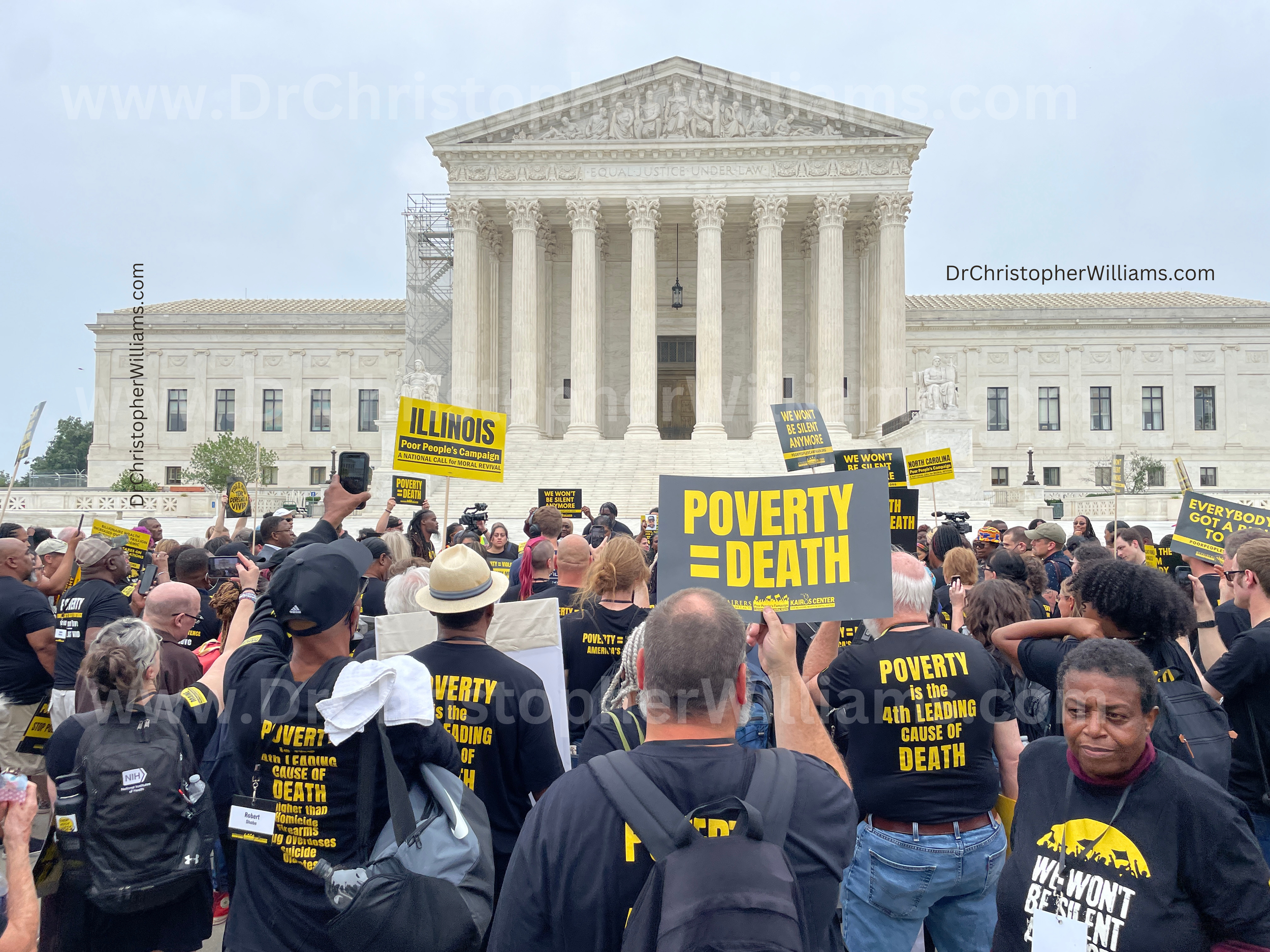
Public Health Economic Analysis
Racial equity laws can be highly beneficial but depends on the overall health of the public health economy. An example from Washington, DC is instructive to elucidate the concept of the public health economy. This economy contrasts with the traditional growth and employment economy. Public health economic theory levels with the political, economic, and social realities to enrich public health understanding of health inequity reproduction. While it takes public health well beyond its traditional disciplinary boundaries, the notion of the public health economy seeks fuller explanations for persistent disparities.

PHL Presidential Memo: End of Chevron Doctrine Opens Pathways on Environmental Racism
IMMEDIATE RELEASE:
July 8, 2024
MEDIA CONTACT: info@publichealthliberation.com
Christopher Williams, PhD, Founding President of Public Health Liberation, has released an executive memo that the US Supreme Court's decision overturning the Chevron deference doctrine opens pathways for environmental equity.
“Communities impacted by environmental racism have been hampered in their efforts for redress because of the US Supreme Court decision in 1984 establishing the Chevron doctrine. That decision compelled judges to defer to a government agency’s interpretation of its authorizing statutes and regulations. The end of that doctrine opens community pathways for the elimination of environmental classism and racism. Consistent with liberation strategies, communities can conduct legal research, seek legal assistance, and form environmental justice coalitions.
The impact of the ’84 Chevron decision has been clear. In my review of case law in the District of Columbia, the doctrine has been widely cited across a range of agency decisions. Holding in DOEE vs East Capitol (2013), for example, the DC Court of Appeals instructed the lower court that it “must give the same deference that this court gives to DOEE’s interpretation of its authorizing statutes and regulations.” That legal precedent gave license for DOEE – DC’s environmental regulatory agency – to engage in sustained, systemic environmental racism.
Until the 2024 decision, courts have been hamstrung to fully exercise their role in interpreting the law. Agencies were given immense latitude as long as the agency’s interpretation was “not plainly wrong or inconsistent with the legislative purpose,” (DOEE vs. East Capitol, 2013). This created a high bar that was, in effect, insurmountable for communities seeking to eliminate environmental racism. The Chevron doctrine has had a highly local impact.
The Chevron doctrine has been used to uphold fines and penalties for environmental violations. In this way, the doctrine has served the public interest. Its reversal may also have highly negative public health and regulatory consequences.
Environmental justice is garnering attention across the nation. In Washington, DC, for instance, a Council bill is seeking environmental justice. In his letter that expresses legislative intent, Councilmember McDuffie explained, “For decades, the District has concentrated facilities that produce air pollution, hazardous waste, water pollution, stormwater runoff, and urban heat island effects in low income and predominantly Black neighborhoods.” [1] The harm that McDuffie highlights is directly traced to DOEE discriminatory regulatory standards for which communities found little relief in a court of law due to the Chevron doctrine.
Affected communities such as PHL members’ communities of practice now see an opening with the end of the Chevron doctrine.”
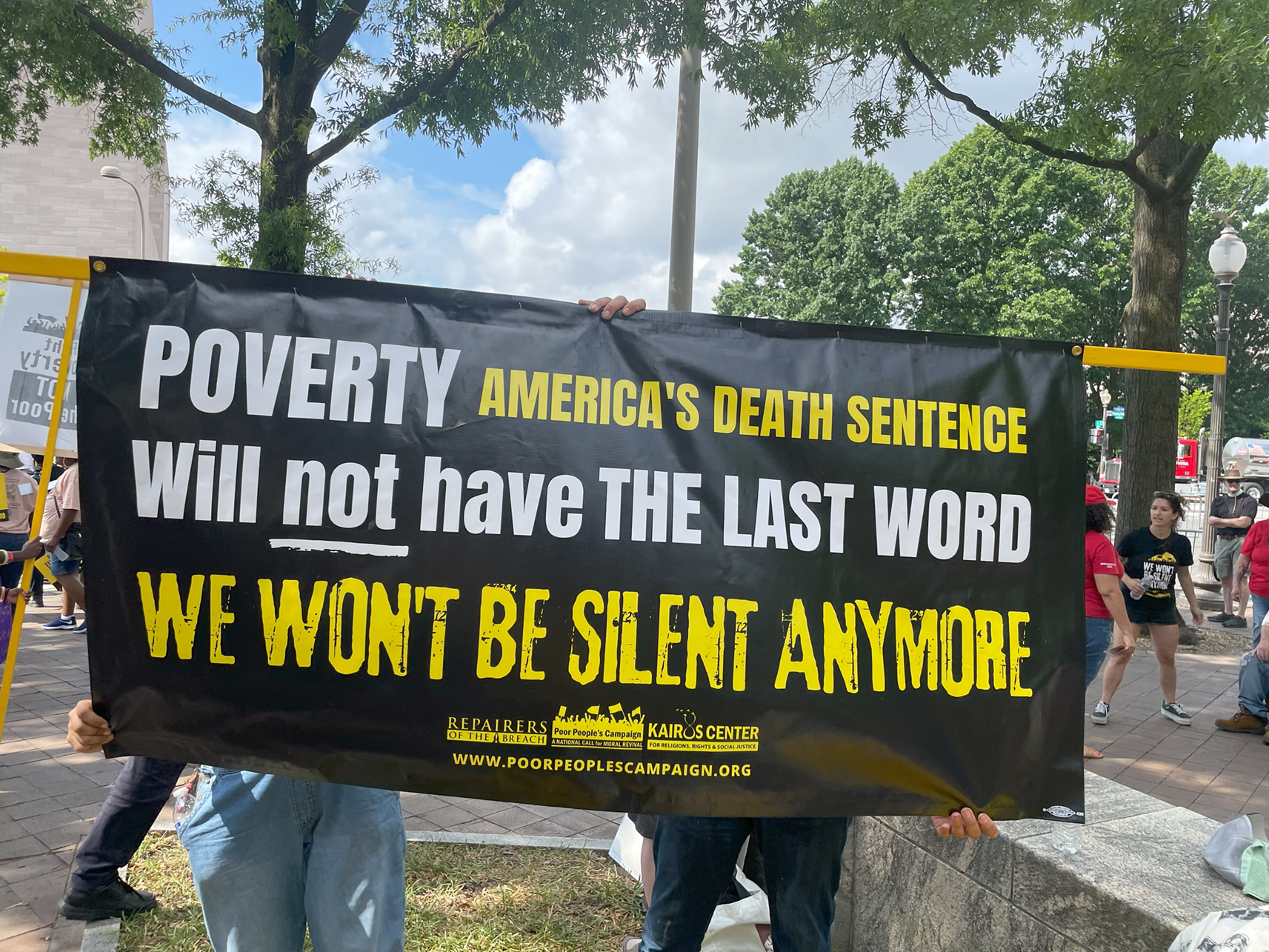
Public Health and Historical Perspectives on the June 29th Poor People’s Campaign
The Poor People’s Campaign recently held its Mass Poor People’s & Low-Wage Workers’ Assembly and Moral March on June 29th in Washington D.C. Led by Rev. Dr. William Barber II and Rev. Dr. Liz Theoharis, the event featured speakers from affected populations, religious, labor, activist, and lay groups. They shared personal and community challenges caused by stark economic, political, and social inequality in the US. This article briefly contextualizes the Poor People’s Campaign from two major perspectives – public health theory and practice and historical. It argues that failure of the political establishment to respond to calls for social reform is likely to carry unacceptable costs – the threat of deepening inequality and civil unrest, even war.

AI for Public Meetings and Monitoring Public Health Economy
The Public Health Liberation AI Work Group is testing the feasibility of using AI in public health discourse and data analysis in preparation for an upcoming manuscript. PHL has posited that ongoing monitoring of the Public Health Economy is key for our vision of public health. There are however many practical challenges. Limited resources to attend public hearing is a major limitation. Did you know that you can leverage AI to get a quick overview of a legislative hearing or public meeting? This brief article describes how you can use AI.
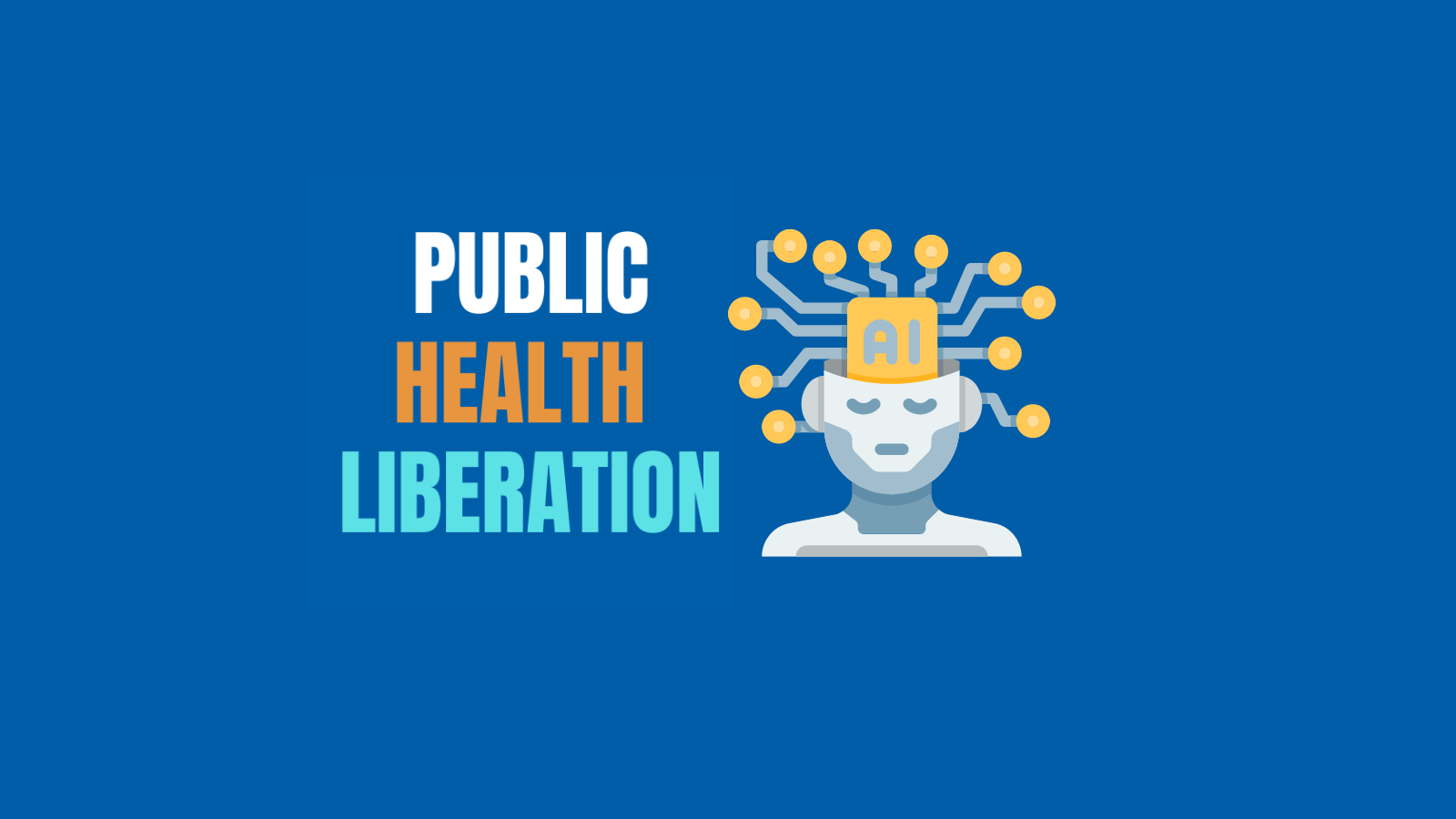
AI Series: A Persuasive Essay on Embracing Public Health Liberation and the Public Health Economy
The field of public health is at a critical juncture, with persistent health inequities demanding innovative approaches to understand and address the root causes of these disparities. Public Health Liberation (PHL) offers a groundbreaking perspective on the public health economy, providing a comprehensive framework for accelerating health equity. This essay aims to persuade you to study the public health economy as defined by PHL, emphasizing its potential to transform public health research and practice.

AI Series: Public Health Economy
We asked AI five essential questions about Public Health Liberation theory.

Public Health Liberation: Summary
Public Health Liberation (PHL) is a new approach to public health that aims to achieve health equity. The authors argue that the "public health economy" as a single analytic lens elucidates the contradictions and tensions that reproduce vast health inequity. The authors draw upon leadership experiences with contemporary issues and community perspectives, making this discussion relatable to non-academicians and bridging academic and popular discourse. Black women constitute a majority of the paper's authors.

Words Matter: Public Health Economy vs. Ecosystem
Public Health Liberation (PHL) theory instigated a debate as to the appropriate conceptual framing of public health. The PHL notion of the Public Health Economy contrasts with other conceptualizations, including the “public health ecosystem”. This debate is important because PHL posits that the Public Health Economy is a major economy equal to the traditional economy in significance and compelling government interest. This article argues that the Public Health Economy has many advantages over the “public health ecosystem” in theory and practice. The Public Health Economy best positions public health to achieve health equity and justice by recognizing that societal structures are failing to produce health outcomes consistent with growth and economic expansion. Transdisciplinary transformation à la Public Health Liberation theory wherein public health assumes leadership across the Public Health Economy is the new frontier of health equity.
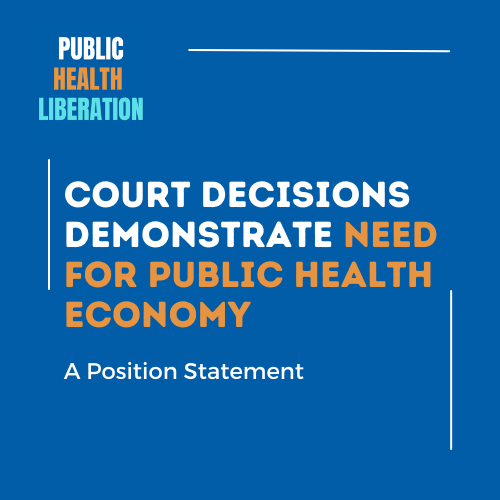
Court Decisions Demonstrate Need for Public Health Economy
Public Health Liberation (PHL) is a membership nonprofit organization that seeks to accelerate health equity through understanding and affecting the Public Health Economy. There exist two major distinct but interdependent economies - the traditional growth economy and the Public Health Economy. The concept of the Public Health Economy is intended to broaden our view of the structural determinants of health through practice-based learning and transdisciplinary synthesis.1 The inaugural PHL manuscript characterized fundamental features of the Public Health Economy. PHL members represent communities of practice that would most benefit from better performance in this economy. A radical reconceptualization of public health theory-building, training, and research is warranted.
Recently, PHL members gathered in solemn reflection upon the Court's sweeping decisions on reproductive rights, affirmative action, treatment of LGBTQ+ populations, and the Bruen decision in 2022. We are experiencing many heightened fears about our short- and long-term health, safety, and liberty. Chief among them are the diminishing educational and employment opportunities for disadvantaged families of all backgrounds and the immediate health effects on women, particularly women of color. Social division, national disunity, and false narratives on colorblindness are disconcerting. The role of the Dred Scott decision in 1857 is instructive of the potential course of the nation. Ideological purity, gun violence, and eroding constitutional protections pose grave threats to the Republic and the Public Health Economy.

Power and Precision in the Public Health Economy
Steven Lukes’ second edition of Power: A Radical View appears to have little import for public health theory and practice. Its academic discussion is well-cited and well-written, but dense and conceptual. lts practice-based reasoning is wanting. Lukes admitted as such “And yet, among those who have reflected on the matter, there is no agreement about to how to define it, how to conceive it, how to study it and, if it can be measured, how to measure it. There are endless debates about such questions, which show no sign of imminent resolution, and there is not even agreement about whether all this disagreement matters.”1
On the other hand, Public Health Liberation seeks transdisciplinary synthesis to elucidate and affect the Public Health Economy. It is imperative to sift through the concepts and theories in Lukes’ Power to fulfill the mission of our transdiscipline. As such, here are five critiques of this discourse to build upon the disciplinary foundation of Public Health Liberation. This discussion is meant to bridge core tenets of PHL, as discussed in our inaugural manuscript. First, we discuss power discourse in the context of Steven Lukes’ Power: A Radical View, then five takeaways for Public Health Economy thought.

City Spending on Policing: Regression Analyses
Public health faces challenges in securing budget priorities. Often, public spending on policing garners a major share of city budgets. It is imperative for public health to understand more about budgeting to gain a foothold when engaging with policymakers. This study relied on results from regression analyses that suggested that policing funding is associated with income, age, and racial groups. Further research is needed to understand how these groups figure into policy deliberations.
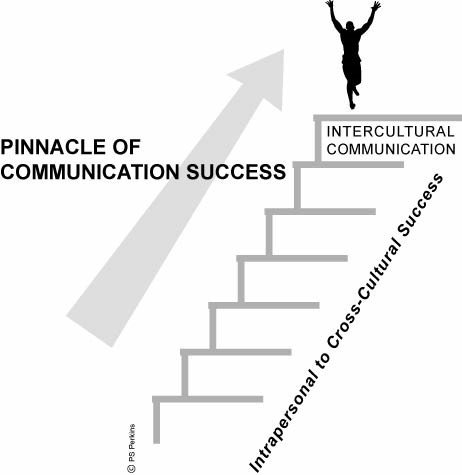
Cross-Cultural Communication Competency for Health Care Providers Toolkit
The Human Communication Institute seeks to provide a praxis for community health that reaches beyond quantitative studies and formulas in a manner that listens, engages, understands and includes the health concerns of silenced community members. The Cross-Cultural Communication Competency for Health Care Providers toolkit seeks to broaden the cultural awareness of practitioners and advocates concerning interfacing and providing care for “other”. Language as a tool is the primary determinant of how an individual seeks, recognizes and engages in their personal care. It is that same tool that health care providers use to understand and support their patients and communities into their desired wellness. The need to transcend language barriers is not just a matter of differing “tongues” but issues that include social reality, semantics, denotative and connotative uses, cultural paradigms of health and healing, formality, mistrust, gender diversity and many other concerns. Health care providers have a massive job to penetrate the mental residue of patients as well as their own depending on training and practical contact. Much of “mental residue” of patients and practitioners as they come together, are words, concepts and experiences handed down anecdotally or experientially for generations.
“We are all residents of our residue.” HCI
Understanding the need to learn, understand and incorporate cross-cultural messaging and practices into patient-provider relationships is foundational to improving community health. In the Public Health Liberation Praxis Terms, we introduced concepts that encourage furtherance of cross-cultural communication studies and practices that dig deeper into knowing and serving the community.
Note the following: Environmental Conditioning – How the environment plays a dominant role in the Public Health conversation and debate as a primary determinant of individual and collective emotional, mental and physical health of marginalized communities. Conditioning mainly occurs through the messages, experiences, behaviors communicated to and around them.

Defending Women and Families Against Policy Violence
The DC Housing Authority held its final listening session on Thursday, May 18 at the King-Greenleaf Recreation Center in Southwest. DC Council required the Stabilization and Reform Board to conduct listening sessions with public housing residents throughout the city as part of a December law reforming the agency's board. The event featured remarks from a panel of Southwest resident council presidents, followed by public testimonies from more than a dozen residents. With few exceptions, all of those who testified were Black women. Their experiences living in poor conditions are best understood as gender and racial policy violence against women and families. Through their tears and justified anger at times, the public health consequences of DCHA's longstanding dysfunction as the city's largest landlord and most notorious slumlord came into full view.

Why So Little Transparency in Public Health Grant Spending?
The lack of transparency in public health federal grant funding poses a major threat to the viability of public health to meet challenges in health and data equity. Websites for federal grant agencies do not contain ready access to successful applications, grant reports, related tools, and datasets. While much of these data can be obtained through a Freedom of Information Act (FOIA) request, federal FOIA offices exercise considerable latitude to place limitations on public access. For example, I recently FOIA’ed to obtain the application for a $3.5 million funded federal grant application on LGBTQ+ mental health. The FOIA officer redacted 382 pages in full and only released 116 pages. The results provided the core of the grant activities, including consent forms and some assessments. The remaining 300-plus document was not released due to “trade secrets and commercial or financial information” and “information in personnel and medical files and similar files”. To gather data on any regular submitted reports to the agency or other pertinent information, I would need to submit a separate FOIA request. These practices that erect barriers to public data - the data that would be available under a FOIA request - is a hinderance to public health innovation.

Securing the Future of Public Health through Advocacy of the Public Health Economy
I recently received an action alert from a prominent medical education organization calling for increased federal funding for physician training programs. Addressing a shortage of up to 124,000 physicians in ten years will ensure access to patient care and readiness for the next public health crisis, claimed the organization. [1] This email prompted several critical reflections. First, their efforts can be understood as public health leadership. Hospital and physician organizations have a longstanding role in public health agenda-setting. Second, the extent of the US physician shortage is widely debated. For over ten years, I served as a medical education researcher and knew that the major accreditor for training programs differed significantly in their assessment - unofficially at least. I recall that the CEO remarked at its international conference several years ago that the urgency of physician shortages was not in the pipeline, but in the geographic distribution of physicians and lack of mid-level providers. In other words, we do not need to increase the rate of physicians entering the workforce as much as address the conditions leading to regional disparities in health care availability due to consolidation, closing of hospitals, and profit-driven health care.[2] “While only 14 percent of Americans—almost 46 million people—live in rural areas, rural communities represent nearly two-thirds of primary care health professional shortage areas (HPSAs) in the country.” [3] I also knew that the accreditor was prevented from political advocacy, unlike many major organizations in this space, because of limitations within its congressional authorization. Many medical education, hospital, and physician organizations encouraged the bipartisan laws in 2020 and 2022 that provide Medicare support for 1,200 residency positions. This new push is seeking to build on their prior legislative success.

Former CDC Directors on the Public Health Economy: Infrastructure is Broken
Former CDC directors gathered in April 2022 to discuss the state of the Centers for Disease Control and Prevention (CDC) - the leading federal public health research and response agency in the US. The Covid pandemic raised the profile and public criticism. They mostly limited their discussion to the traditional public health infrastructure of surveillance, public health research, and emergency preparedness and response. Their critical assessment of the CDC can be extrapolated to support Public Health Liberation (PHL) theory on disorder in the public health economy, which contravenes the public health commitment and capacity to address health inequity. Accelerating health equity particularly by income and race is the mission of Public Health Liberation. The challenges within the CDC are structural, political, and cultural, encumbered by underfunding and a lack of mission-driven strategic focus. By its own admission, “The Centers for Disease Control and Prevention (CDC) faces structural and systemic operational challenges, which were exacerbated during the COVID-19 pandemic…However, since the pandemic, we also acknowledge that CDC is responsible for some large, public mistakes.”
Their discussion highlights the interaction of the political economy with public health aims and provide evidence of the assumptions of public health realism that posits hyper-competition and tensions to explain constraints on the CDC and the public health economy broadly. Rick Berke, Co-Founder and STAT Executive Editor moderated a critical dialogue among Bill Foege (CDC Director, 1977 to 1983), Tom Frieden (CDC Director, 2009 to 2017), Julie Gerberding (CDC Director, 2002 to 2009), Robert Redfield, (CDC Director, 2018 to 2021), and Bill Roper (CDC Director, 1990 to 1993). The purpose of this essay is to ground CDC challenges within PHL theory and practice.
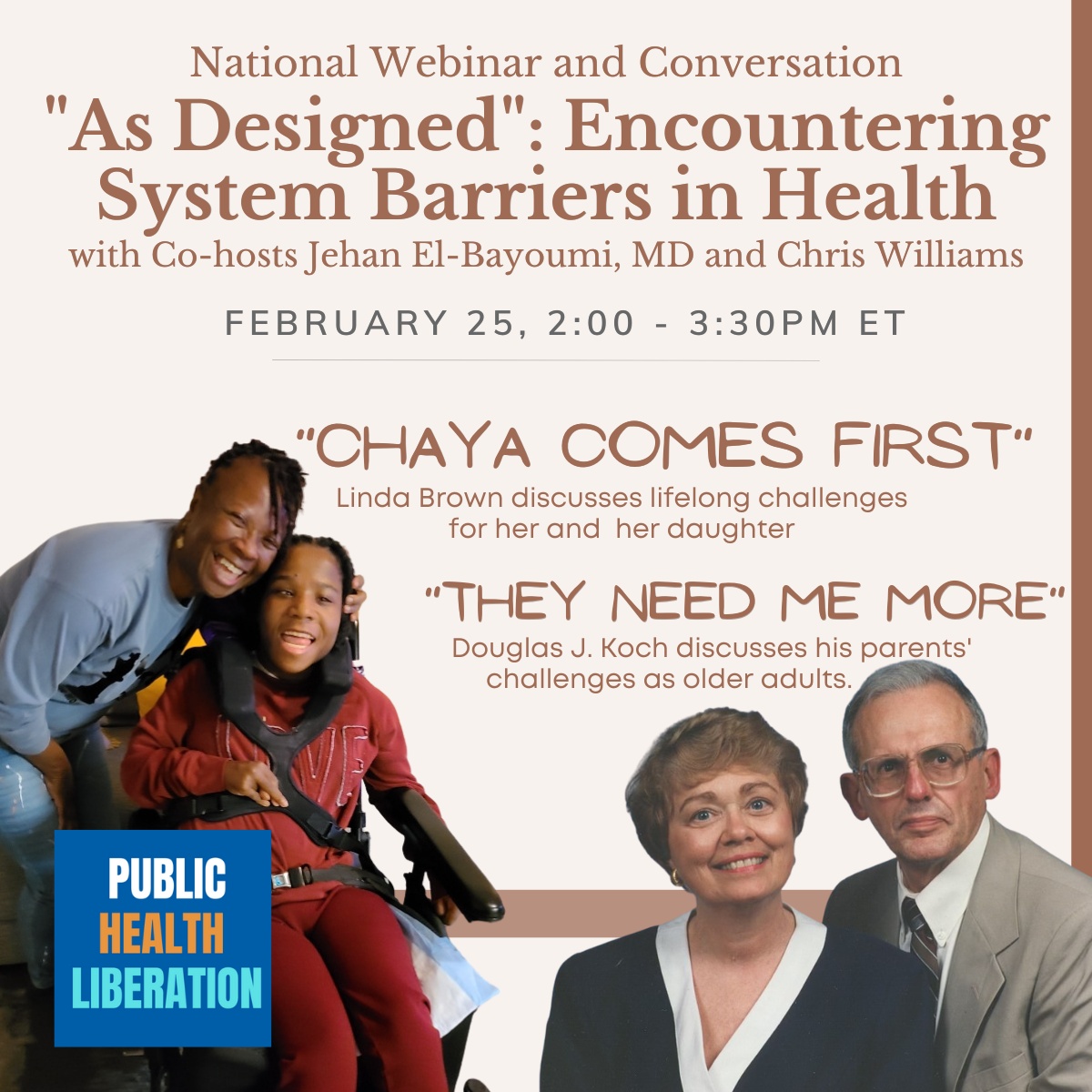
Insight into the Public Health Economy: Perspectives from Seniors and Disability Populations (Part 1)
By Christopher Williams
Founding Director, Public Health Liberation
I recently took an opportunity to rewatch our inaugural national webinar from February 25, 2022, entitled, “As Designed": Encountering System Barriers in Health - A National Webinar and Conversation”. Dr. Jehan El-Bayoumi co-hosted with guests Linda Brown and Doug Koch, EdD. Linda is a senior and public housing community leader in Washington, DC who takes care of his adult daughter with cognitive and physical disabilities. Doug is Associate Director of Teaching and Learning for the Medical Education Center of Excellence at PCOM's Philadelphia location. He takes care of his aging parents in a suburb outside of Philadelphia, Pennsylvania.
The first essay in this series discusses my reflections on Doug Koch’s contributions to our first webinar. I discuss my three major takeaways: Supporting Humanistic Public Health, Aging is Collective Responsibility, and Structural Barriers.

Applying PHL Analysis to Discussion of Black Nurses
Public Health Liberation believes that social discourse is a viable and essential source of information for health equity discourse and research. Webinar conversations are an underutilized data source to gain insight and to affect the Public Health Economy. This article will focus on the recent discussion from Get Wealthy with host Deborah Owens, where she invites Meedie Clark Bardonille, Chair DC Board of Nursing/ Founder & President of Black Nurse Collaborative Inc. They discuss Black nurses’ health and wealth-building. We categorized their major discussion topics under the five key concepts of Public Health Liberation - value/philosophy, theory, practice, research, and training.

Liberación en Salud Pública: una transdisciplina emergente para dilucidar y transformar la economía de la salud pública
La Liberación en Salud Pública (PHL por sus siglas en inglés) es una innovadora teoría general de la salud pública orientada a acelerar la equidad en la salud. Este artículo proporciona una rica síntesis de tradiciones filosóficas, teorías novedosas y enfoques para establecer las bases de una nueva transdisciplina de salud pública. Los autores argumentan que la “economía de salud pública” como lente analítica única aclara las contradicciones y tensiones que reproducen una vasta inequidad en la salud. Elaborado por la mayoría de las mujeres negras, las experiencias y perspectivas de la comunidad son una fortaleza importante de este artículo porque se inspiran en experiencias de liderazgo con temas contemporáneos.
Creative Arts.
“Maybe, we the project”
University professor and poetess PS Perkins reminds us about the humanity and lived experiences of families who live in public housing communities. She read her poem, “When a House is Not a Home” at the PHL National Webinar and Conversation on Liberation Philosophy, Systems Thinking, and Social Determinants of Health.
Documentary on Gentrification Captures Community Voices
Prior to starting Public Health Liberation,, Christopher Williams began an unfinished documentary to capture community voices in this gentrifying neighborhood of Washington, DC.
Submit to The Hub.
Please use the form below to submit. If you would rather include an attachment, please email phlhubsubmit@gmail.com.
Terms and Conditions: Upon submitting, you agree that you are the copyright holder or otherwise are legally entitled to submit for publication in The Hub and that you are truthfully representing your true or legal identity with the contact information that you include with your submission. You agree that the content is not published elsewhere. Once you submit to The Hub, we retain the ability to publish on our website and other promotional materials. You may request to remove content at any time.


